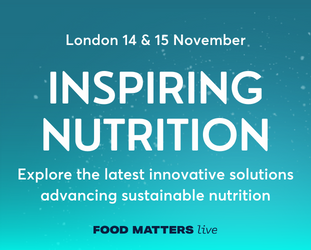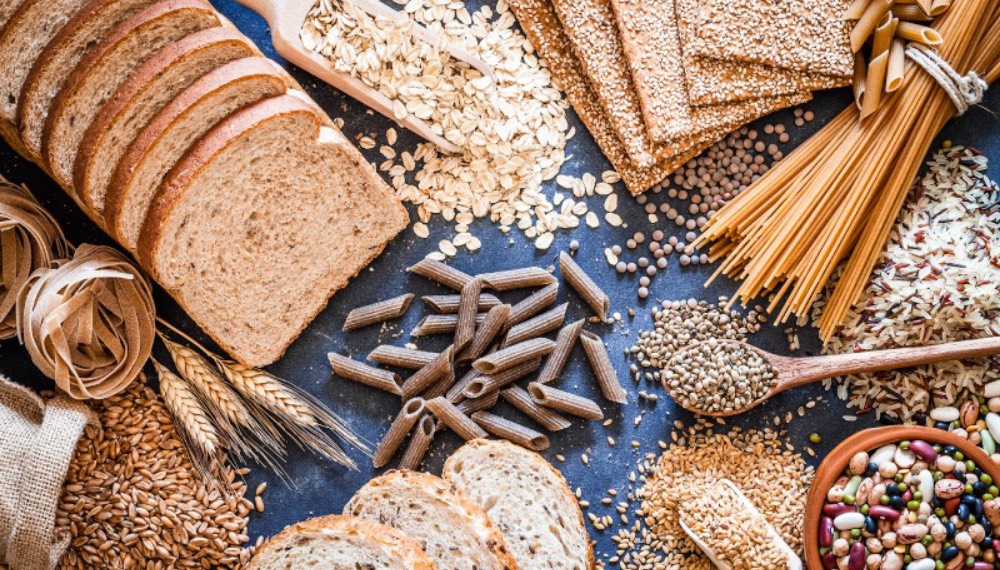Reproductive health: the beneficial role of nutrition in men and women’s fertility

Take this magical supplement, drink this bright green smoothie or eat that particular superfood every day to transform your fertility. Couples trying to conceive are so often the target market for brand advertisers because when you really want a baby, why would you compromise? But can nutrition really help fertility and reproductive health?
Of course, food is no quick fix, but certain ingredients and eating habits can improve overall health and wellbeing, while optimising one’s reproductive health too.
Fertility is not just a female issue
“Often, in traditional female-male couples, the woman takes on this role [of improving her nutrition],” says Registered Dietitian Cordula Henggeler who specialises in women’s health. But fertility isn’t solely a female issue and taking a whole-couple approach benefits both partners, as she explains: “Sperm quality has gone downhill in recent years and up to 30% fertility problems are linked to male factors such as reduced sperm quality or quantity. We don’t talk about this enough.”
Good nutrition positively impacts egg quality, can improve one’s chance of having a viable baby, and helps regulate periods too, according to Henggeler who takes a holistic view: “People come to me when they have problems with fertility and I see such positive outcomes by making dietary changes, but … couples may need to have a doctor supporting them, perhaps a physio to help with endometriosis. Nutrition is a big part of the puzzle, but if someone is struggling with their fertility, we should look beyond what they eat, at what is going on inside the body and work with a team of specialists.”
Even with medical support or assisted conception, fertility journeys can be overwhelmingly complicated. Registered Dietitian Monika Bettney, also a specialist in fertility, adds that managing stress, sleep, movement and emotional regulation alongside nutrition is vital. “Even with periods, some women don’t ovulate properly as a result of high stress, too much exercise or not enough nutrition,” says Bettney. So those connections aren’t always obvious.
How the Mediterranean diet can aid fertility
Lightly grilled sardines, a wholesome lentil casserole or fresh green leafy salads with feta, sun-blushed tomatoes and a drizzle of extra virgin olive oil… deliciously healthy? Yes. The best nutrition to optimise your reproductive health? Apparently so. A Greek study of 244 women highlights that a varied Mediterranean diet is associated with better IVF outcomes for over 35s. This same diet is associated with higher sperm concentration, total sperm count and sperm motility.
“The most researched dietary pattern that’s helpful in terms of fertility for both natural conception and IVF is the Mediterranean diet,” explains Bettney. “It’s not to say other patterns like Japanese or South-East Asian diets aren’t as good….it’s about looking at the principles and thinking about which nutrients you’d be having then adapt it to any other cuisine.”
So it’s flexible rather than prescriptive and Henggeler advises to simply ‘aim for colour on the plate’: “[Mediterranean food] includes lots of healthy fish with omega 3 fats [to improve egg and sperm quality and implantation], increases antioxidant intake [to help your body repair cell damage] and consumption of fruit and veg, with a little meat if people eat that, plus legumes that are cheap and full of fibres and minerals.”
Added extras: the importance of micronutrients in fertility
Pregnancy is a nutrient-intensive process, and Henggeler recommends a pre-natal multivitamin for simplicity: “I see it as an insurance policy – we don’t eat perfectly every single day and there are a few nutrients that we know pregnant women are at risk of being low in such as iron and iodine.”
Some supplements such as Omega 3 tend to be quite expensive, but others are more easily available. Free NHS Healthy Start vitamins contain folic acid combined with vitamins C and D, which is recommended for everybody in the UK but also helps improve reproductive health.
Guidelines recommend that women trying to conceive should take 400 micrograms of folic acid daily, for at least three months before trying to conceive. That’s because most women won’t know they are pregnant until they have missed a period, but folic acid is essential during those first 21 days of pregnancy. Perhaps one day, this same precautionary approach could apply to any other micronutrients.
As a nation, we don’t eat iodised salt, despite Unicef’s global movement to add iodine to edible salt and protect healthy brain development in utero. The recommended 150 micrograms of iodine aids healthy menstruation and good thyroid function. Other essentials for conception include zinc, vitamin B12 and choline, a lesser-known nutrient naturally found in a number of foods, such as eggs and broccoli, that plays a critical role in foetal development.
Better nutrition, fewer restrictions
The odd takeaway or chocolate walnut whip won’t matter. Both Henggeler and Bettney are swift to avoid demonising fast or processed foods. For both dietitians, the priority is to put delicious, healthy, nutrient-rich and affordable food on the menu most of the time, rather than restricting anything.
Alcohol is one exception to that rule because at high levels, it can increase the risk of birth defects or lower the chance of a healthy pregnancy. At low levels, it could impact egg and sperm quality. “Even with the permitted amount [14 units of alcohol per week when not pregnant], alcohol can be problematic when it comes to ovulation or IVF,” says Bettney. A recent US study of more than 400 women found that moderate drinking (3-6 drinks per week) was associated with a reduced chance of conception by 44% compared to non-drinkers, and research suggests that women who want to conceive should avoid alcohol in the last two weeks of their cycle after ovulation.
The science isn’t as clearcut with caffeine, although one British Medical Journal review outlines that pregnant women should be advised to avoid caffeine. For those wishing to conceive, Henggeler advises not to drink “too much” coffee or caffeinated cola, although what that means exactly is debatable because after drinking, the time it takes for caffeine to halve in concentration varies between 3-7 hours.
“It’s about nourishing yourself and what I recommend to people varies so much on the individual,” says Bettney who suggests taking gradual steps. “If people are struggling to find time to cook, ready meals might be a compromise to start with.”
More than food: why cooking methods matter
It’s not just the ingredients we eat that matter. The way we cook can influence our reproductive health too. During high heat cooking, ‘advanced glycated end-products’ or AGEs are formed when sugars attach to proteins. Through increased inflammation, this can affect male and female reproductive health at high levels. “Imagine you create char marks on blackened toast or barbecue grilled food,” describes Henggeler. “These AGEs can significantly affect egg and sperm quality. Steaming and stir fries are great, and even boiling if you don’t overcook veg.”
Synthetic chemicals also get into food, either through farming, processing or packaging. A few of these – known as endocrine-disrupting chemicals or EDCs – disrupt hormones. Some pesticides are associated with increased risk of endometriosis, but they are impossible to avoid completely and organic food can often be expensive. Henggeler recommends using the Clean Fifteen and Dirty Dozen lists, published annually by the US-based NGO Environmental Working Group, for more of a steer on this.
Chemicals known as phthalates and bisphenols can interfere with hormones if they leach out from plastic packaging, especially at high heat, so microwaving your leftovers in plastic containers isn’t the healthiest option. Opt for microwave-safe ceramic, glass or metal food storage containers wherever possible.
Studying the nuanced effects of EDCs on female reproductive health is expensive, slow and complex. Most toxicity research focuses on males because the parameters won’t change with menstrual cycles, pregnancy and menopause. Now, an EU-wide project called Freia is calling for more research and better regulation to protect women and their fertility.
The timeline
Once you’ve adopted a Mediterranean diet and the right pre-natal vitamins, how quickly might these changes in nutrition improve your reproductive health? The answer: it depends. An organic diet can rapidly reduce the amount of glyphosate (a common pesticide) in the body by 70% after only six days. Henggeler explains that certain B vitamins could replenish quite quickly if they are taken every day, while an iron deficiency (diagnosed following a blood test) may take a couple of months to rebalance and perhaps six if someone has little or no periods or polycystic ovary syndrome.
The more time you give yourself to improve your diet before conceiving, the better, she says: “Our eggs mature over three-month cycles, sperm takes 72 days so in terms of egg and sperm quality, it’s never too late to make improvements. [Nutrition] won’t be an overnight fix but even just eating an extra portion of fruit or veg every day is good.”
Bettney cautiously suggests improving your nutritional intake at least three months before conception, but adds “that would be a mad rush” depending on what your baseline is like: “If you’re starting from further away, it will take longer. Habit change takes time.”
Optimal nutrition, now and for future generations
Even before conception, environmental factors can determine which genes will be activated or deactivated in the DNA within an egg or sperm. As Henggeler explains, when egg or sperm is being produced, external influences can affect the baby’s risk of having type 2 diabetes, perhaps, or heart disease later in life. This ‘epigenetics’ demonstrates the importance of looking after your health before you conceive, not just when you’re pregnant. Babies born to undernourished mothers during the Dutch famine of 1944-1945 were more susceptible to conditions such as breast cancer and coronary heart disease as adults. Those health effects differed according to the specific timing of maternal undernourishment during gestation.
Beyond that, one’s health influences one’s grandchildren too. When a women is pregnant with a girl, the foetus is already forming all the eggs she’ll ever have inside her ovaries. Californian epidemiologist Barbara Cohn has followed 15,000 pregnant women and their families since 1959 in a multigenerational research project that highlights the longevity of toxic chemical exposure. She found that granddaughters of women exposed to the now-banned insecticide DDT (dichlorodiphenyltrichloroethane) tended to start their menstrual periods before the age of 11, and had an increased breast cancer risk. So as Henggeler puts it, “If we can keep quality of eggs and sperm better we can influence the health of the baby in the future too.”
“The principles for fertility and healthy pregnancy are the same essentially for general health for women at any life stage,” explains Bettney. “If we make these changes in a way that’s sustainable in the longterm, this way of living, with better sleep, exercise and healthy eating, will not only help you through pregnancy but also through motherhood, perimenopause and old age. This is your nutrition for life.”
Foods to incorporate in the diet
- Extra virgin olive oil
- Colourful mix of fruits and vegetables, including frozen options which are often cheaper, preferably at least 30 different types of plants per week
- Wholegrains such as bread, rice and oats
- Pulses such as beans, chickpeas and lentils
- Nuts, eg walnuts, and seeds eg sunflower seeds
- Tinned or fresh fish such as mackerel and other oily fish
- Some yoghurts, dairy products and eggs
- Some white meat
Foods to limit or avoid
- Alcohol (avoid completely if possible)
- Caffeine (reduce to less than 200mg per day ideally)
- Trans fats and saturated fats such as margarine
- Red meat and highly processed meats
- White bread or pasta
Supplements to aid fertility
The British Dietetic Association (BDA) recommends the following supplements to those who want to conceive and during pregnancy:
- Folic acid
- Vitamin D
- Omega 3
- Iodine
- Iron
- Vitamin B12
- Calcium
- Zinc
- Choline









